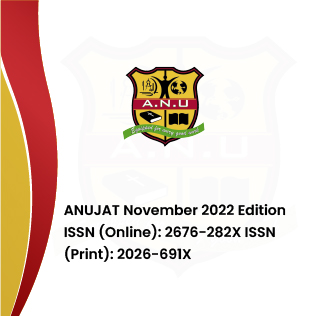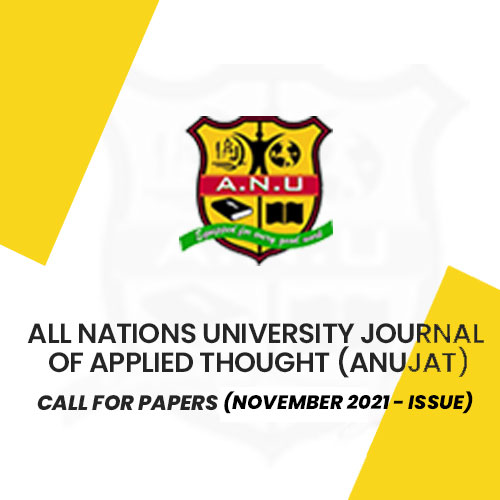ANUJAT is committed to a more open research landscape, facilitating faster and more effective research discovery by enabling reproducibility and verification of data, methodology and reporting standards. We encourage authors of articles published in our journal to share their research data including, but not limited to: raw data, processed data, software, algorithms, protocols, methods, materials.
Refer to the table below to understand the various standardized data sharing policy categories:
| Data availability statement is published1 | Data has been shared2 | Data has been peer reviewed3 | |
| Encourages Data Sharing | Optional | Optional | Optional |
| Expects Data Sharing | Required | Optional | Optional |
| Mandates Data Sharing | Required | Required | Optional |
| Mandates Data Sharing and Peer Reviews Data | Required | Required | Required |
1 A data availability statement confirms the presence or absence of shared data.
2 Links to data in data availability statements are checked to ensure they link to the data that the authors intended. If data have been shared in a data repository, the data availability statement includes a permanent link to the data. Shared data is also cited.
3 Quality and/or replicability of linked data are peer reviewed. Depending on the journal, this may be to peer review the quality of the data by ensuring that the results in the paper and the data in the repository align (for example, sample sizes and variables match), or it may be to peer review the replicability of the data to ensure that the claims presented in the journal article are valid and can be reproduced.
Encourages Data Sharing
ANUJAT encourages authors to share the data and other artefacts supporting the results in the paper by archiving it in an appropriate public repository. Authors may provide a data availability statement, including a link to the repository they have used, in order that this statement can be published in their paper. Shared data should be cited.” All accepted manuscripts may elect to publish a data availability statement to confirm the presence or absence of shared data. If you have shared data, this statement will describe how the data can be accessed, and include a persistent identifier (e.g., a DOI for the data, or an accession number) from the repository where you shared the data. You may use the Standard Templates for Author Use or draft your own.
Expects Data Sharing
ANUJAT expects that data supporting the results in the paper will be archived in an appropriate public repository. Authors are required to provide a data availability statement to describe the availability or the absence of shared data. When data have been shared, authors are required to include in their data availability statement a link to the repository they have used, and to cite the data they have shared. Whenever possible the scripts and other artefacts used to generate the analyses presented in the paper should also be publicly archived. If sharing data compromises ethical standards or legal requirements, then authors are not expected to share it.”
Mandates Data Sharing
ANUJAT requires, as a condition for publication, that the data supporting the results in the paper will be archived in an appropriate public repository. Authors are required to provide a data availability statement, including a link to the repository they have used, and to cite the data they have shared. Whenever possible the scripts and other artefacts used to generate the analyses presented in the paper should also be publicly archived. Exceptions may be granted at the discretion of the editor, for example, if sharing data compromises privacy of human data, ethical standards or legal requirements. If authors are unable to share data (for example, if sharing data compromises ethical standards or legal requirements) then authors are not required to share it and must describe restrictions in their data availability statement.”
Mandates Data Sharing and Peer Reviews Data
ANUJAT requires, as a condition for publication, that the data supporting the results in the paper will be peer reviewed and archived in an appropriate public repository. Authors are required to provide a data availability statement, including a link to the repository they have used, and to cite the data they have shared. Whenever possible the scripts and other artefacts used to generate the analyses presented in the paper should also be publicly archived. Exceptions may be granted at the discretion of the editor. If sharing data compromises ethical standards or legal requirements, then authors are not required to share it.”
And:
“Peer review of empirical data will be conducted to confirm the quality of the shared data, for example, that sample sizes match, that the variables described in the article are present as fields in the data repository, that data is complete; that data is properly labelled and described; and that it has the appropriate metadata for the kind of data being shared.”
Or:
“Peer review of empirical data will be conducted to confirm that the data reproduce the analytic results reported in the paper.”
ANUJAT has three policies on data sharing:
Data Policy 1:
We require that the data generated by your research that supports your article be made openly and publicly available upon publication of your article. Where it is not possible or viable to make data openly available (due to confidentiality or sensitivity issues), they should be shared through a controlled access repository.
Data Policy 2:
We strongly encourage that data generated by your research that supports your article be made available as soon as possible, wherever legally and ethically possible.
For data on clinical articles, we require data from clinical trials to be made available upon reasonable request.
We require that a data sharing plan must be included with trial registration for clinical trials. Changes to the plan must be noted in the Data Availability Statement and updated in the registry record (to comply with ICMJE recommendations).
We strongly encourage that data generated by your research that supports your article be made available as soon as possible, wherever legally and ethically possible.
Data Availability Statement
ANUJAT require a Data Availability Statement for any submitted research articles.
Standard Templates for Author Use
Below is a list of standard templates for the text that will appear in the “Data Availability Statement” portion of your article.
| Availability of data | Template for data availability statement |
| Data openly available in a public repository that issues datasets with DOIs | The data that support the findings of this study are openly available in [repository name e.g “figshare”] at http://doi.org/[doi], reference number [reference number]. |
| Data openly available in a public repository that does not issue DOIs | The data that support the findings of this study are openly available in [repository name] at [URL], reference number [reference number]. |
| Data derived from public domain resources | The data that support the findings of this study are available in [repository name] at [URL/DOI], reference number [reference number]. These data were derived from the following resources available in the public domain: [list resources and URLs] |
| Embargo on data due to commercial restrictions | The data that support the findings will be available in [repository name] at [URL / DOI link] following an embargo from the date of publication to allow for commercialization of research findings. |
| Data available on request due to privacy/ethical restrictions | The data that support the findings of this study are available on request from the corresponding author. The data are not publicly available due to privacy or ethical restrictions. |
| Data subject to third party restrictions | The data that support the findings of this study are available from [third party]. Restrictions apply to the availability of these data, which were used under license for this study. Data are available [from the authors / at URL] with the permission of [third party]. |
| Data available on request from the authors | The data that support the findings of this study are available from the corresponding author upon reasonable request. |
| Data sharing not applicable – no new data generated | Data sharing is not applicable to this article as no new data were created or analyzed in this study. |
| Author elects to not share data | Research data are not shared. |
| Data available in article supplementary material | The data that supports the findings of this study are available in the supplementary material of this article |
| Data sharing not applicable – no new data generated, or the article describes entirely theoretical research | Data sharing not applicable to this article as no datasets were generated or analysed during the current study |
When data is available and linked, authors will need to provide a citation of the data in their reference list.
On submission, authors are asked to select at least one of the standardized Data Availability Statements text options below in bold as applicable and to supplement these statements with additional information as noted in the guidance below. Authors can select more than one statement if they have data under different conditions. For clinical articles, the ICMJE recommendations provide further guidance on how to compose a rich statement.
These statements will be published under the header ‘Data Availability Statement’ within the footnotes section of the final published article.
Data are available in a public, open access repository
Please state the repository name, the persistent URL, and any conditions of reuse (eg. licence, embargo). All data that are publicly available and used in the writing of an article should be cited in the text and the reference list, whether they are data generated by the author(s) or by other researchers.
Data are available upon reasonable request
Please state what the data are (e.g. de-identified participant data), who the data are available from, their publishable contact details (e.g. a generic lab email address or an individual’s ORCID identifier – please ensure you have permission) and under what conditions reuse is permitted. Is there additional information available (e.g. protocols, statistical analysis plans)?
Data may be obtained from a third party and are not publicly available
Please state what the data are (e.g. de-identified participant data), who the data are available from, their publishable contact details (e.g. a generic lab email address or an individual’s ORCID identifier – please ensure you have permission), and under what conditions reuse is permitted. Is there additional information available (e.g. protocols, statistical analysis plans)
There are no data in this work
Please state ‘Not applicable’ in the free text box
All data relevant to the study are included in the article or uploaded as supplementary information
For clinical articles, please ensure this does not include patient identifiable data. Please state ‘Not applicable’ in the free text box
No data are available
Please state ‘Not applicable’ in the free text box
How to cite data
All data that are publicly available and used in the writing of an article should be cited in the text and the reference list – whether they are data generated by the author(s) or by other researchers.
Data citations should include author(s), title, data repository, the document version (e.g. most recent date modified), the Digital Object Identifier (DOI) and should follow APA referencing style
Add [dataset] as a prefix immediately before the reference, so we can properly identify it as a data reference; this identifier will not appear in the published article.
Example:
[dataset] [52] Wang G, Zhu Z, Cui S, Wang J. Data from: Glucocorticoid induces incoordination between glutamatergic and GABAergic neurons in the amygdala. Dryad Digital Repository, August 11, 2017. https://doi.org/10.5061/dryad.k9q7h
How to share data
For clinical data (Individual Participant Data) we request that you use controlled access repositories, such as clinicalstudydatarequest.com, the YODA project, or Vivli.
For pre-clinical data we recommend using recognised subject-specific repositories, such as GenBank, where relevant and available.
There are also a number of recognised, general repositories in which to deposit data, for example, DRYAD, OSF, FigShare and Zenodo. FAIRsharing and re3data.org provide a curated list of repositories.
What data should be shared
We encourage you to make available as much of the underlying data from your article as possible (without compromising participant privacy), but at least the minimum data required to reproduce the results presented in the associated article.
We consider any files generated by your research as constituting relevant data. This may be raw or processed data. Examples include (but are not limited to):
- Individual-level de-identified patient data
- Survey results
- Interview transcripts
- Statistical code
- Images
- Videos
- Spreadsheets
- Audio files
- Text files
- Imaging and scan files
To enable reuse and enhance reproducibility, all data should be shared using the sources file in which they were originally generated, for example:
- Images should be provided as .png, .jpg, .eps, etc.
- Text files should be provided as .txt, .doc, .rft, etc.
- Spreadsheets should be provided as .csv, .xls, .tsv, etc.
- Videos should be provided as .mp4, .avi, .wav, etc.
- Imaging and scan files should be provided in .img, .dcm, hdr, etc.
Data should not be shared in any way that could compromise participant anonymity or privacy, and data should not be shared if that would require the authors to break any laws or licensing agreements. If the data used were licensed from a third party, the data availability statement should explain how to obtain a licence for that data.
Where a research community in a particular field has established standards for what, where, and how data should be shared, we expect authors to meet those.
While data sharing is not mandatory in our journal, ANUJAT reserves the right to request at any time confidential access to any primary data needed to reproduce the article so that the results reported can be verified. Editors may also use data availability statements to inform their editorial decisions.
Data from clinical trials
Where required, reports of clinical trials must include a commitment to make relevant anonymised patient-level data available on reasonable request. This policy applies to any research article that reports the outcomes of a clinical trial of any type of intervention.
The International Committee of Medical Journal Editors (ICMJE) requires that clinical trials that begin enrolling participants on or after 1 January 2019 must include a data sharing plan in the trial’s registration. We encourage all authors to follow this best practice, however this is compulsory on the ANUJAT.
How to access data that is available upon request?
Data requesters should do the following:
- Email the corresponding author for the paper to request the relevant data.
- For requests to ANUJAT, a Rapid Response must also be submitted to the article.
- Provide the authors of the article a detailed protocol for the proposed study, and to supply information about the funding and resources you have to carry out the study.
- If appropriate, invite the original author[s] to participate in the re-analysis.
- If a month elapses without a response from the authors, please send an email to the ANUJAT managing editor ([email protected]).
- We will assess the request and if appropriate will encourage the authors or their institution to share the data, although ANUJAT are not in a position to compel data release or broker agreements.




